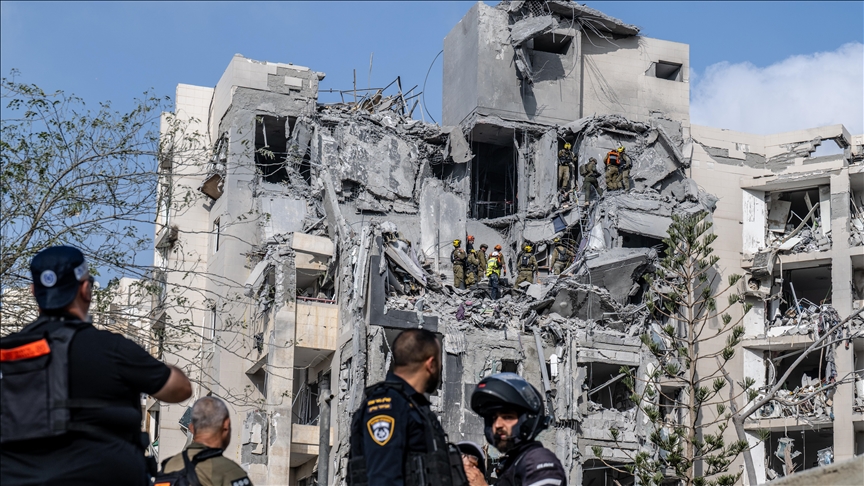OPINION - EU stances on Israel-Iran tension
Rising tension in Middle East �� which once again sees Israel as the perpetrator of violence �� has made it clear that Europe is becoming fragmented by exposing Europe's weakness in finding its own diplomatic space
 Missile fired from Iran hits southern Israeli city of Beersheba
Missile fired from Iran hits southern Israeli city of Beersheba
-The author is scientific director of the Observatory on Türkiye at the Rome-based think tank CeSPI.
ISTANBUL
With the recent US involvement in the Iran-Israel conflict and the resulting regional spillover, there is widespread fear within the international community of further escalation. To some extent, international concerns reflect discordant national stances. Indeed, in a climate of extreme polarization, both politically and in public opinion, the West – and more specifically Europe – finds itself fragmented and marginalized. Despite the convergence on the urgent need to restore diplomatic dialogue and resume peace negotiations to avoid a new escalation of violence, the gulf between the states defending Tel Aviv and Washington’s intervention and those calling for an immediate de-escalation is significant.
EU stances on Israel
Beyond the common exhortation "to all parties to exercise maximum moderation, and to avoid any act of retaliation to find a diplomatic solution for regional stability and global security," the EU is quite divided. At the onset of Israel’s attack on Iran, European Commission President Ursula von der Leyen effectively endorsed Israel and its right to exist. On X, she said: “I spoke with President Herzog about the escalation. I reiterated Israel’s right to defend itself and protect its people.” A few days before the US intervention, this statement created a significant watershed within the European bloc, drawing harsh criticism from several European diplomats who denounced the lack of consensus within the EU and questioned the appropriateness of issuing such a unilateral declaration.
EU foreign policy chief Kaja Kallas called the situation "dangerous," adding that "diplomacy remains the best path forward." She also reiterated: "Iran must not be allowed to develop a nuclear weapon, as this would pose a threat to international security. I urge all parties to step back, return to the negotiating table and prevent further escalation." Antonio Costa, the European Council president, taking a more moderate approach, expressed deep concern: "I am deeply alarmed by the news coming from the Middle East. I call on all parties to show restraint and respect for international law and nuclear safety,” he added. "Diplomacy remains the only way to bring peace and security to the Middle East region. Too many civilians will once again be victims of further escalation," he said.
However, the ongoing debate in Europe pivots on the legitimacy of the Israeli action aimed at preventing Iran's nuclear program, a point endorsed by many, but discussed by others. Regarding the leaders' declarations, the main European capitals seem to be quite aligned. Italian Prime Minister Giorgia Meloni's Italy, as also declared by Foreign Minister Antonio Tajani, supports Israel's right to self-defense and the urgency of preventing Iran from possessing an atomic bomb. Italy also declares itself against suspending the EU Association Agreement with Israel and ready to contribute to the mediation and resumption of the negotiations that the US and Iran have started directly with the mediation of Oman. However, Rome is aware that the American attack on Iran's nuclear facilities changes the scenario and that it may cause a much broader crisis, potentially affecting various American interests in the region. Although French President Emmanuel Macron had preliminarily been in contact with Netanyahu, siding on Israel's right to guarantee its own security and stressing that France will take part in operations to protect and defend Israel in the event of further reprisals conducted by Tehran, before the upcoming NATO summit he said "there is no legal framework" for American intervention. On the other hand, German Chancellor Friedrich Merz strongly confirmed Israel's "right to defend itself" and said "the US was right to bomb Iran." Even British Prime Minister Keir Starmer praised the US for taking action to reduce Iran's nuclear threat.
Relaunching Europe's diplomatic role: A failed attempt
France, Germany, and Britain – the so-called "coalition of the willing" – aimed to arise as mediators in the conflict. In the attempt to revive negotiations on the Iranian nuclear issue, the day before the US intervention in Iran, they called a meeting in Geneva with Iranian Foreign Minister Abbas Araghchi and EU foreign policy chief Kaja Kallas. In this spirit, the goal was relaunching diplomacy and emerging from the marginal position where the EU has been sadly confined for too long. As a matter of fact, Europe faces new challenges such as instability and migration flows; this is a very crucial topic in Brussels’ agenda. It is worth mentioning that without any doubt, those issues would not easily disappear even if there is regime change in Iran. However, the European Union stance is consistent with the assumptions of the recent G7 reading: "We affirm that Israel has the right to defend itself. We reiterate our support for Israel's security. We also affirm the importance of protecting civilians. Iran is the main source of instability and terror in the region. We have always been clear that Iran will never have a nuclear weapon." However, the rising tension in Middle East – which once again sees Israel as the perpetrator of violence – has made it evident that Europe is becoming fragmented by exposing Europe's weakness in finding its own diplomatic space and a common stance pivoting on a genuine interpretation of international law. Given the unpredictability of the American administration, the EU could in fact set itself up as a vocal actor of its founding principles, but unfortunately once again Brussels shows a persistent inconsistency.
*Opinions expressed in this article are the author’s own and do not necessarily reflect Anadolu's editorial policy.








